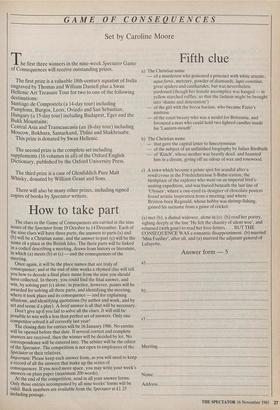GAME OF CONSEQUENCES Set by Caroline Moore
The first three winners in the nine-week Spectator Game of Consequences will receive outstanding prizes.
The first prize is a valuable 18th-century aquatint of India engraved by Thomas and William Daniell plus a Swan Hellenic Art Treasure Tour for two to one of the following destinations: Santiago de Compostela (a 14-day tour) including Pamplona, Burgos, Leon, Oviedo and San Sebastian; Hungary (a 15-day tour) including Budapest, Eger and the Bukk Mountains; Central Asia and Transcaucasia (an 18-day tour) including Moscow, Bokhara, Samarkand, Tbilisi and Shakhrisabz. This prize is donated by Swan Hellenic.
The second prize is the complete set including supplements (16 volumes in all) of the Oxford English Dictionary, published by the Oxford University Press.
The third prize is a case of Glenfiddich Pure Malt Whisky, donated by William Grant and Sons.
There will also be many other prizes, including signed copies of books by Spectator writers.
How to take part
The clues to the Game of Consequences are carried in the nine issues of the Spectator from 19 October to 14 December. Each of the nine clues will have three parts; the answers to parts (a) and (b) will be a Christian name, and the answer to part (c) will be the name of a place in the British Isles. The three parts will be linked in a codicil describing a meeting, drawn from history or literature, in which (a) meets (b) at (c) — and the consequences of the meeting.
Once again, it will be the place names that are truly of consequence; and at the end of nine weeks a rhymed clue will tell you how to decode a final place name from the nine you should have collected. In theory, you could find the final answer, and win, by solving part (c) alone; in practice, however, points will be awarded for solving all three parts, and identifying the meeting, where it took place and its consequence — and for explaining allusions, and identifying quotations (by author and work, and by act and scene if a play). A brief answer is all that will be necessary. Don't give up if you fail to solve all the clues. It will still be possible to win with a less than perfect set of answers. Only one competitor solved it all correctly last year?
The closing date for entries will be 16 January 1986. No entries will be opened before that date. If several correct and complete answers are received, then the winner will be decided by lot. No correspondence will be entered into. The arbiter will be the editor of the Spectator. The competition is not open to employees of the Spectator or their relatives.
Important: Please keep each answer form, as you will need to keep a record of all the answers that make up the series of consequences. If you need more space, you may write your week's answers on plain paper (maximum 200 words). At the end of the competition, send in all your answer forms. Only those entries accompanied by all nine weeks' forms will be valid. Back numbers are available from the Spectator at £1.25 including postage.
Fifth clue
a) The Christian name
— of a murderess who poisoned a prisoner with white arsenic, aqua fortis, mercury, powder of diamonds, lapis constitus, great spiders and cantharides, but was nevertheless pardoned (though her female accomplice was hanged — in yellow starched ruffles, so that the fashion might be brought into 'shame and detestation') — of the girl with the bocca baciata, who became Fazio's mistress
— of the court beauty who was a model for Britannia, and favoured a man who could hold two lighted candles inside his lantern-mouth'.
b) The Christian name — that gave the capital letter to Smectymnuus — of the subject of an unfinished biography by Julian Birdbath — of `Kinch', whose mother was beastly dead, and haunted him in a dream, giving off an odour of wax and rosewood.
c) A town which became a prime spot for scandal after a rendezvous in the Friedrichstrasse S-Bahn station; the birthplace of the explorer who went on an imperial bird's- nesting expedition, and was buried beneath the last line of `Ulysses'; where a one-eyed ex-designer of chocolate posters found artistic inspiration from a meeting; and where Brixton-born Reginald, whose hobby was shrimp-fishing, gained his surname from a game of cricket.
(a) met (b), a dismal widower, alone in (c). (b) read her poetry, sighing deeply at the line 'He felt the chastity of silent woe', and returned (with gout) to read her love-letters . . . BUT THE CONSEQUENCE WAS a romantic disappointment. (b) married `Miss Fuzilier', after all, and (a) married the adjutant general of Lafayette.
Answer form — 5
Meeting Name Address


































































 Previous page
Previous page